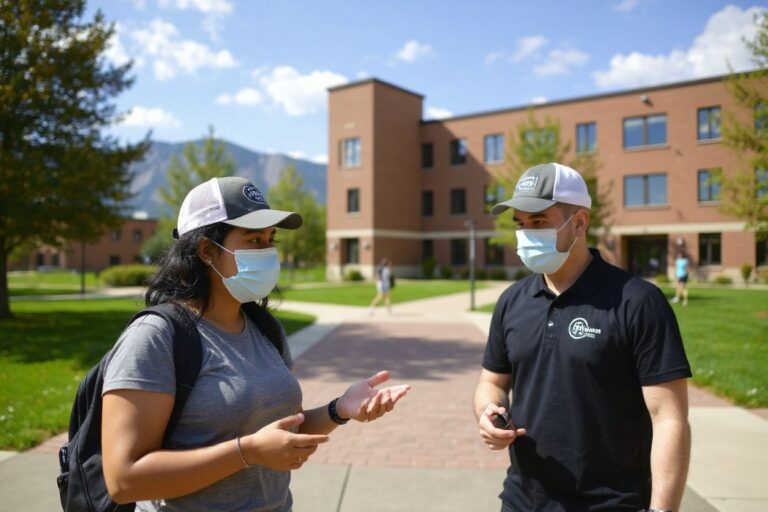
Many US universities are now open for the fall semester, albeit in a limited capacity. Students attend a mix of in-person and online classes, with many residence halls reopening too.
It didn’t take long before some reporting a surge in COVID-19 cases on their campuses. At the time of writing, the University of Alabama has a total of 531 confirmed cases between students, faculty and staff on its Tuscaloosa campus since classes resumed on Aug. 19.
In-person classes at the University of North Carolina at Chapel Hill are now cancelled, after 135 positive COVID-19 cases were reported among students and employees just a week after the fall semester began. They have since reverted back to online learning. On Aug. 15, 2020 Oklahoma State University announced 23 positive COVID cases in an off-campus sorority house, where residents are now in isolation or quarantine. The University of Wyoming also reported Monday 38 active cases among students and staff.
 An incoming freshman moves into a campus dormitory at the University of Colorado Boulder on Aug. 18, 2020 in Boulder, Colorado.
An incoming freshman moves into a campus dormitory at the University of Colorado Boulder on Aug. 18, 2020 in Boulder, Colorado.
Why is the number of cases rising?
Despite universities banning parties, encouraging social distancing, as well as regularly disinfecting public facilities, several students have reportedly breached these protocols, leading to new surges in cases. Wearing masks is now mandatory in several states, but universities can’t control if they wear them while off-campus or at parties.
According to the New York Times, universities are struggling to control the behaviour of young adults who are “paying for the privilege to attend classes.” It was also reported that students are still freely inviting friends who live elsewhere into their dorm rooms or residence halls despite being told not to do so.
In social media, videos show hundreds of students gathering without wearing masks or social distancing, such as at the University of North Georgia. At the University of Notre Dame, in-person classes were suspended after 147 students tested positive. Most of them were seniors living off-campus who caught the virus at gatherings where masks were not worn and social distancing was not practised.
An email sent to students urged them to be responsible for their actions. “University authorities cannot be in all spaces at all times. Compliance depends on all community members having the courage to call others to behaviour that protects us all.” “The number of cases we experienced in the first week of classes far exceeded our estimates, and it stressed the new systems we put in place to test and care for our community members,” it said.
Liked this? Then you’ll love…
Which US universities are offering fee discounts?
Can new international students enter the US? US lawmakers call for clarity







